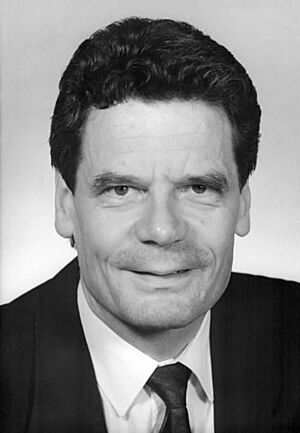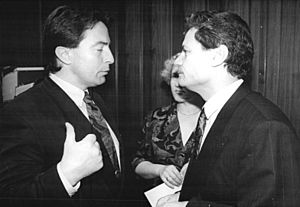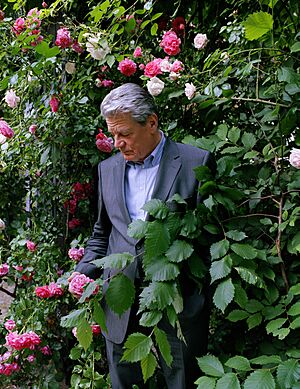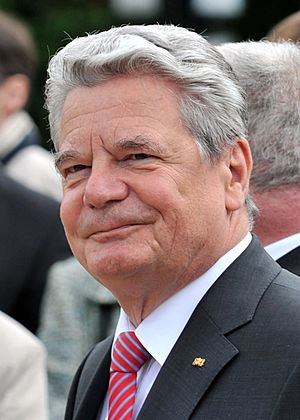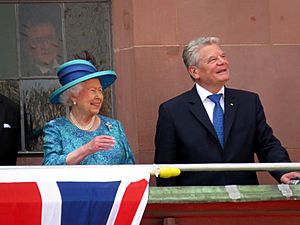Joachim Gauck facts for kids
Quick facts for kids
Joachim Gauck
|
|||||||||||||||||||||
|---|---|---|---|---|---|---|---|---|---|---|---|---|---|---|---|---|---|---|---|---|---|
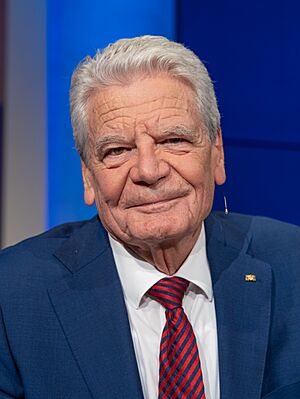
Gauck in 2023
|
|||||||||||||||||||||
| President of Germany | |||||||||||||||||||||
| In office 18 March 2012 – 18 March 2017 |
|||||||||||||||||||||
| Chancellor | Angela Merkel | ||||||||||||||||||||
| Preceded by | Christian Wulff | ||||||||||||||||||||
| Succeeded by | Frank-Walter Steinmeier | ||||||||||||||||||||
| Federal Commissioner for the Stasi Records | |||||||||||||||||||||
| In office 4 October 1990 – 10 October 2000 |
|||||||||||||||||||||
| Preceded by | Office established | ||||||||||||||||||||
| Succeeded by | Marianne Birthler | ||||||||||||||||||||
|
|||||||||||||||||||||
| Personal details | |||||||||||||||||||||
| Born | 24 January 1940 Rostock, Gau Mecklenburg, Nazi Germany |
||||||||||||||||||||
| Political party | Independent (since 1990) | ||||||||||||||||||||
| Other political affiliations |
New Forum/Alliance 90 (1989–1990) | ||||||||||||||||||||
| Spouse |
Gerhild Radtke
(m. 1959; separated 1991) |
||||||||||||||||||||
| Domestic partner | Daniela Schadt (since 2000) | ||||||||||||||||||||
| Children | 4 | ||||||||||||||||||||
| Signature |  |
||||||||||||||||||||
| Website | Official website: https://www.joachim-gauck.de/ | ||||||||||||||||||||
Joachim Gauck (born January 24, 1940) is a German politician. He was the President of Germany from 2012 to 2017. Before that, he was a pastor and a brave activist who stood up against the communist government in East Germany.
During the Peaceful Revolution in 1989, Gauck helped start the New Forum movement. This group worked to bring down the communist government in East Germany. Later, his group joined others to form Alliance 90.
In 1990, he was elected to the People's Chamber, East Germany's parliament. After German reunification, he became a member of the German Parliament, the Bundestag. He served for only one day! He then became the first Federal Commissioner for the Stasi Records. This job meant he had to investigate the crimes of the communist secret police, known as the Stasi. He was called a "Stasi hunter" for his work.
In 2010, he ran for president but did not win. Many people liked him, and the media called him "the better President" and "the president of hearts." When the president stepped down in 2012, Gauck was elected. He was supported by almost all major political parties.
Gauck's family experienced totalitarianism firsthand. His father was sent to a Soviet prison camp. This experience shaped Gauck's views on freedom and human rights. He has written books about freedom and democracy. Former Chancellor Angela Merkel called him a "true teacher of democracy."
Contents
Early Life and Growing Up in East Germany (1940–1989)
Joachim Gauck was born in Rostock, a city in Germany. His father was a ship's captain. After World War II, when Joachim was eleven, his father was arrested by Soviet forces. He was sent to a prison camp in Siberia for four years. For a long time, his family did not know if he was alive. He was finally freed in 1955.
This difficult experience made Gauck strongly against communism. He refused to join the communist youth movement in East Germany. He wanted to study journalism, but the government would not let him because he was not a member of the ruling party.
Instead, he chose to study theology and became a pastor in the Protestant church. He felt the church was one of the few places in East Germany where people could think freely. The secret police, the Stasi, watched him closely. They called him an "incorrigible anti-communist."
Career During and After the Peaceful Revolution of 1989
In 1989, during the Peaceful Revolution, Gauck became a leader in the New Forum movement. This group pushed for democracy in East Germany. He also joined large protests against the communist government.
In 1990, he was elected to the People's Chamber, East Germany's parliament. He represented the Alliance 90 group. The day before East Germany officially ended, he was chosen to be in charge of the Stasi archives.
After Germany reunited, he became the first Federal Commissioner for the Stasi Records. His job was to investigate the crimes of the communist secret police. He held this important position until 2000.
Gauck was also a member of the Bundestag, the German Parliament, for a very short time. He served from October 3 to October 4, 1990. He stepped down to take on the role of Stasi Records Commissioner. This made him the shortest-serving member of the Bundestag in history.
Presidential Election in 2010
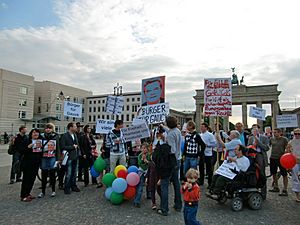
In 2010, Joachim Gauck was nominated to become the President of Germany. He was supported by the Social Democratic Party (SPD) and the Green Party. Gauck was not a member of either party. He described himself as a "leftist, liberal conservative."
Many people respected Gauck across different political groups. He was popular because of his strong moral character during the communist era. He was also known for his work investigating the Stasi.
The only major party that did not support him was Die Linke, which is linked to the former East German Communist party. They criticized Gauck because of his work exposing communist injustices. In the election, Gauck lost to Christian Wulff.
President of Germany (2012–2017)
Becoming President
In 2012, the president at the time, Christian Wulff, resigned. Joachim Gauck was then nominated again as a candidate for president. This time, he had the support of almost all major parties. These included the CDU, CSU, FDP, SPD, and the Greens.
People across Germany were very happy about his nomination. Polls showed that most voters approved of him. Only Die Linke continued to criticize him.
On March 18, 2012, Gauck was elected President of Germany. He received 991 out of 1,228 votes. He took his oath of office on March 23, 2012. In 2016, Gauck announced that he would not run for re-election in 2017. He said his age was the reason.
Presidential Visits to Other Countries
As president, Gauck visited many countries. In 2014, he chose not to attend the Winter Olympics in Sochi, Russia. He did this to show his concern about human rights issues in Russia.
In August 2014, he met with French President François Hollande. They marked the 100th anniversary of the start of World War I. They laid the first stone for a memorial in France for soldiers killed in the war.
Hosting State Guests
President Gauck often welcomed leaders from other countries to Germany. In September 2014, he hosted heads of state from German-speaking countries. These included Austria, Switzerland, Belgium, Luxembourg, and Liechtenstein. They met to discuss challenges like the aging population in Europe. They also remembered the Peaceful Revolution of 1989.
Personal Life
Joachim Gauck married Gerhild "Hansi" Radtke in 1959. They had four children: Christian, Martin, Gesine, and Katharina. His children faced discrimination in East Germany because their father was a pastor. Christian, Martin, and Gesine were able to move to West Germany in the 1980s.
Since 2000, his partner has been Daniela Schadt, a journalist. Gauck is a member of the Protestant Church in Germany. He served as a pastor for the Evangelical Lutheran Church of Mecklenburg.
Selected Publications
- 1991: Die Stasi-Akten. Das unheimliche Erbe der DDR. (The Stasi Files. The Eerie Legacy of the GDR.)
- 1998: Das Schwarzbuch des Kommunismus – Unterdrückung, Verbrechen und Terror (contributor, on political oppression in East Germany)
- 2009: Winter im Sommer, Frühling im Herbst. Erinnerungen. (Winter in Summer, Spring in Autumn. Memoirs.)
- 2012: Freiheit. Ein Plädoyer (Freedom. A Plea)
Honours and Awards
National Honours
- Grand Cross Special Class of the Order of Merit of the Federal Republic of Germany (2012)
Foreign Honours
Gauck has received many honours from other countries, including:
- Grand Cordon of the Order of Leopold (Belgium)
- Collar of the Order of the White Lion (Czech Republic)
- Grand Cross of the National Order of the Legion of Honour (France)
- Knight Grand Cross with Collar of the Order of Merit of the Italian Republic (Italy)
- Knight of the Order of the Gold Lion of the House of Nassau (Luxembourg)
- Grand Cross of the Order of St. Olav (Norway)
- Honorary Knight Grand Cross of the Most Honourable Order of the Bath (United Kingdom)
Awards
He has also received many awards for his work, such as:
- 1997: Hannah Arendt Prize
- 1999: Honorary doctorate from the University of Rostock
- 2010: Geschwister-Scholl-Preis
- 2014: Leo Baeck Medal
- 2021: Franz Werfel Human Rights Award
See also
 In Spanish: Joachim Gauck para niños
In Spanish: Joachim Gauck para niños
 | Stephanie Wilson |
 | Charles Bolden |
 | Ronald McNair |
 | Frederick D. Gregory |


